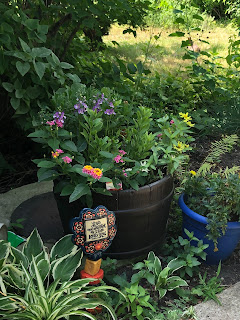 |
| Garden ornament by Sue at FaithInClay.com |
It's gonna be a hot one.
The eggplant I brought home from the farmers' market a little while ago is warm and radiating heat on the kitchen counter. That dark purple skin absorbed plenty of energy just this morning, lying in the sun on the farmer's table in the asphalt parking lot that hosts the market. I bought corn and tomatoes, a single large beet, a bell pepper, and a quart of blueberries. The local peaches I look forward to all summer are ripening in a basket at the back of the counter, and there are glads, standing tall in a vase -- not in the living room or dining room, but right at the entrance to the kitchen where Eliza and I will see them whenever we come into the house.
This is summer. A season of family vacations, swimming in lakes, playing in the backyard, hanging laundry out to dry at Grandma's house. Summer theater, summer concerts, mosquitoes, and baseball. Memories of my dad painting the house with Grandpa helping in those weeks between summer school and the start of the fall term. We kids arranged the sliced tomatoes and bologna sandwiches for lunch and later watched as Daddy cracked open a beer at 3:30 in the afternoon, before cleaning up for the day. The cold bottle sweated and dripped in the outdoor air, just as we did.
The heat did not seem so malevolent then. Meteorological data shows it's worse now, and we know now that heat creates deadly risk, especially for people who are old and on the margins. That was probably true in 1965, too, but like pollution and everything having to do with humankind's abuse of nature, so much worse now.
When it's very cold and when it's very hot, I often think of the people who lived on this land a century or two ago. How did they do it? How did they experience the weather's life-threatening extremes? This morning as I came outside to get the car out of the garage, I thought of Aunt Eller, my character in a production of "Oklahoma!" fifteen summers ago. Aunt Eller's appearance onstage starts the show, and it was my favorite thing to do — to walk out on stage, gaze into the lights and see a summer morning rolling in from the east, the sky growing bluer by the minute. She was anticipating the heat and the work of the day and then shared that picture with Curly singing "Oh, What a Beautiful Morning." I don't know what the audience saw looking back at us, but it sure was beautiful from where I sat.
Aunt Eller had sweat rolling down her back within the hour, part of belonging to the land her family farmed. And that land, of course, originally belonged to indigenous people who had themselves belonged to it for millennia.
I just finished reading "The Invention of Nature: The Adventures of Alexander von Humboldt, the Lost Hero of Science," by Andrea Wulf. Humboldt lived from 1769-1859. He was a polymath, a man of wide-ranging knowledge, not just of science, but also of poetry, classics and politics, He wrote numerous books, some detailing botanical and zoological discoveries from his exploration of South America, others more sweeping views of Nature and the Cosmos. He was widely read and widely celebrated in the 19th century, an important influence on Darwin and later, John Muir. Unlike the cataloguers and classifiers of this and that species who preceded him, he saw the natural world as a unity, one organism, and wrote about the interdependency of plants, animals, climate and geography decades before Ernst Haeckel, a German scientist who'd read his Humboldt, coined the term Ökologie, from the Greek oikos "house, dwelling place, habitation."
 |
| What is this? I didn't plant it. |
This suburban street is a long way from the second-growth state park forests that were the back-to-nature destinations of my childhood. And in 2022, I am far more aware of the threat that out-of-balance human beings pose to the organism that is planet earth. But there are pale butterflies fluttering across the patio and birds chirping as they settle in for a less-active afternoon in the heat. Even the bird poop on the chair I'm not sitting in is part of creation, part of the creator's worked-out vision of unity.
Praise be!
(Also, praise be that Congress is actually about to pass climate change legislation!)

1 comment:
Again, a beautiful post. Reminding me to stop, look and listen.
Post a Comment